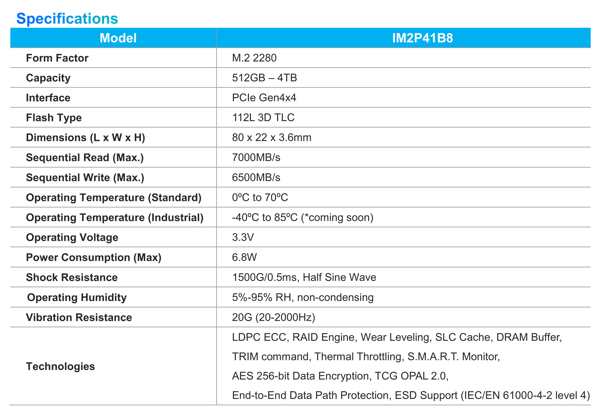Adata IM2P41B8 Industrial-Grade PCIe Gen4x4 Up to 4TB M.2 2280 SSD With WD 112-Layer 3D TLC Flash
Up to 7,000/6,500MB/s RW speeds, up to 220,000/175,000 IO/s random RW, and featuring 3,000 P/E cycle rating for durability
This is a Press Release edited by StorageNewsletter.com on August 31, 2022 at 2:02 pmAdata Technology Co., Ltd. announced the IM2P41B8, its first industrial-grade PCIe Gen4x4 M.2 2280 SSD.
Utilizing the PCIe Gen4x4 interface, it delivers read and write performance for processing large data loads, and the durability and security industrial-grade applications require.
The IM2P41B8 M.2 2280 is equipped with Western Digital Corp.‘s 112-layer 3D TLC flash memory with a maximum capacity of 4TB. With the PCIe Gen4x4 interface and NVMe 1.4 support, it offers performance that is 230% higher than PCIe 3.0, random RW speeds of up to 220,000/175,000 IO/s, and sustained RW speeds of up to 7,000/6,500MB/s. What’s more, it feature 3,000 P/E cycle rating for durability.
With the increasing complexity of big data analysis, ML, and AI algorithms, performance storage devices are required to process even more data. The IM2P41B8 is equipped with an 8-channel controller that can be used to add additional equipment and flexibly build smaller, more compact industrial systems. Meanwhile, the built-in DDR4 DRAM buffer increases the available bandwidth, improving data access speed, providing smoother real-time data analysis.
With the support of the company’s advanced R&D technology, the next-gen PCIe 4.0 industrial-grade SSDs support LDPC ECC error correction mechanism, RAID engine, and End-to-End Data Path Protection technology, which can effectively improve the accuracy and integrity of data transmissions. In addition, with Thermal Throttling, temperatures can be automatically adjusted to prevent overheating and enhance stability. In addition, in view of the characteristics of the IoT and big data analysis, IM2P41B8 supports AES 256-bit encryption technology, which can reduce security risks when processing large volumes of data.
The company has worked towards the integration of software and firmware and introduces A+ SSDTOOL monitoring software, A+ OPAL encryption software, industrial-grade wide temperature tolerance (-40°C to 85°C) and other technologies into its products, creating a new era of efficiency, large-capacity, high-stability, high-speed computing.

















 Subscribe to our free daily newsletter
Subscribe to our free daily newsletter

